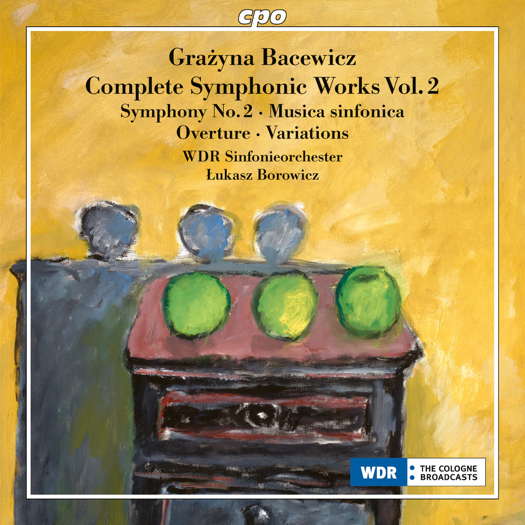- Digressione
- Meistersinger
- Métier
- Noriko Koide
- Handel: Tamerlano
- David Watkin
- Vicki Field
- Korngold: 4 Lieder nach Shakespeare
 SPONSORED: An Integral Part - Lindsey Wallis looks forward to the Canadian Music Centre's tribute concert to composer Roberta Stephen.
SPONSORED: An Integral Part - Lindsey Wallis looks forward to the Canadian Music Centre's tribute concert to composer Roberta Stephen.
All sponsored features >>
 DISCUSSION: John Dante Prevedini leads a discussion about Composers, individuals or collective?, including contributions from David Arditti, Halida Dinova, Robert McCarney and Jane Stanley.
DISCUSSION: John Dante Prevedini leads a discussion about Composers, individuals or collective?, including contributions from David Arditti, Halida Dinova, Robert McCarney and Jane Stanley.

Some Real Gems
GEOFF PEARCE will return often to this recording of orchestral music by Grażyna Bacewicz
'... full of invention and surprises ...'
One of the twentieth century composers that have most piqued my interest and affection, Grażyna Bacewicz (1909–1969), was first brought to my attention by the Polish Embassy in New Zealand when I was a boy when they gifted me an LP of the two piano quintets. I have loved her music ever since. If you are unfamiliar with this composer and her music, I urge you to start paying some attention to her oeuvre as you will uncover some real gems. The works on this disc encompass a symphony, orchestral variations, and the Musica Sinfonica in tre movimenti.
The first work on the disc, simply entitled 'Overture for Orchestra', was written in 1943 and first performed two years later. Known as her most popular work, it is boisterous, full of energy and receives a scintillating performance here that is guaranteed to push you back in your seat.
Listen — Grażyna Bacewicz: Overture for Orchestra
(555 660-2 track 1, 4:21-5:01) ℗ 2023 cpo :
This is followed by the longest work on the disc, Symphony No 2, composed in 1951. It is in four movements and is seldom performed. This is a great pity because it is an effective and attractive work, written when the composer was at the height of her neoclassical period.
The first movement goes through quite a few changes over the course of its length, starting off rather quietly and slowly but with more powerful passages in between. It then speeds up about halfway through in a section that has much energy, before the return of a theme that starts in the oboe, and was a feature of the slower opening section. Towards the end a bell-like motive occurs and the movement ends in a brass-dominated triumph.
Listen — Grażyna Bacewicz: Con passione (Symphony No 2)
(555 660-2 track 2, 5:23-6:02) ℗ 2023 cpo :
This is followed by a broad and a little ominous slow movement, occasionally broken by tender relief, but this is fleeting, and tender sections are interrupted often by heavier passages.
The third movement is a scherzo that is full of excitement and joy and shows the composer's orchestration skills. I find her style is unlike anyone else I have heard. The orchestra will be held at peak attention to the rhythmic intensity of this movement.
Listen — Grażyna Bacewicz: Scherzo. Vivo (Symphony No 2)
(555 660-2 track 4, 2:30-3:17) ℗ 2023 cpo :
The final movement, which is tight and concise, shows that the composer works her mood and tempo changes with great skill, and this is one of the things I like about her music, the flow always feels natural, even if there is often great variety. The movement ends triumphantly.
Listen — Grażyna Bacewicz: Finale. Allegro moderato (Symphony No 2)
(555 660-2 track 5, 3:27-4:17) ℗ 2023 cpo :
I find Variations for Orchestra, composed in 1957, an attractive and again, an engaging work. The variations from the light-hearted theme are inventive, and it is easy to see their relationship to the theme. Of all the works on this disc, this is my favourite.
Listen — Grażyna Bacewicz: Variations for Orchestra
(555 660-2 track 6, 5:00-5:45) ℗ 2023 cpo :
The last work presented is the Musica sinfonica in tre movimenti. This was composed in 1965 and would be the most challenging for those that are not familiar with Bacewicz's music. I find it a piece that is not only very skilfully composed, but also one that grabs my interest immediately.
The first Movement, Tesi, is only two minutes long, but it launches immediately into dramatic and uncompromising music which is very different from the earlier works on this disc. It contains an astonishing wealth of ideas, and at times reminds me of some of the sections in The Rite of Spring.
Listen — Grażyna Bacewicz: Tesi (Musica sinfonica in tre movimenti)
(555 660-2 track 7, 1:26-2:07) ℗ 2023 cpo :
The second movement, Dialogo, is the core of this piece, both in terms of length and complexity. This is not music that is difficult to relate to, though, and I do believe that most listeners will be as intrigued as I was on first hearing this.
Listen — Grażyna Bacewicz: Dialogo (Musica sinfonica in tre movimenti)
(555 660-2 track 8, 3:56-4:53) ℗ 2023 cpo :
The final movement, Gioco, is dance-like and again, arresting and rhythmic, full of invention and surprises, and requiring great precision from the orchestra. There are many changes in speed but the transitions always work beautifully and the music is colourful and never dull.
Listen — Grażyna Bacewicz: Gioco (Musica sinfonica in tre movimenti)
(555 660-2 track 9, 3:32-4:16) ℗ 2023 cpo :
I am full of admiration for Grażyna Bacewicz, and when I first heard those quintets, a couple of years after the composer's death, she was barely known outside Poland. It is good to see that over the last few years, her music has gained a much wider appreciation. This most welcome disc features a very fine orchestra, the WDR Sinfonieorchester, and conductor, Łukasz Borowicz, who brings considerable understanding to the intricacies of these compositions. The programme notes are informative and the recording sounds wonderful on good equipment. For me, this is definitely a disc I will return often to.
Copyright © 13 February 2024
Geoff Pearce,
Sydney, Australia



